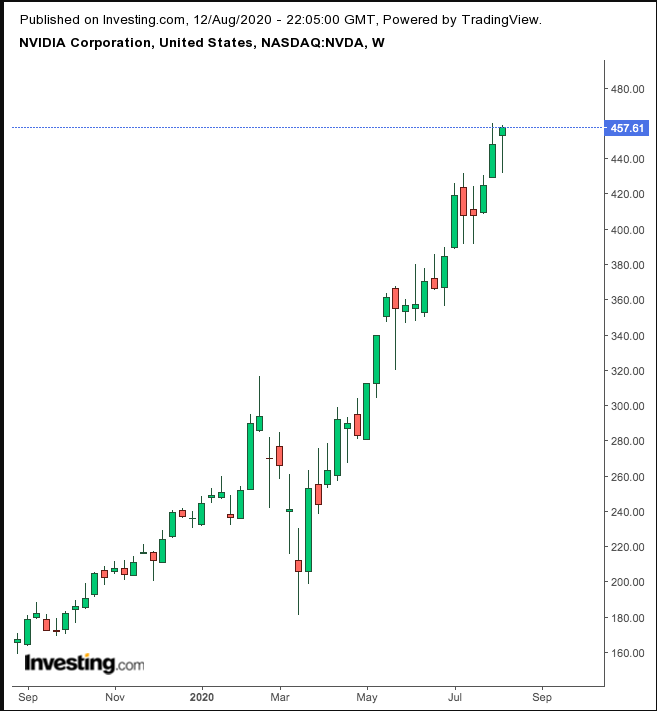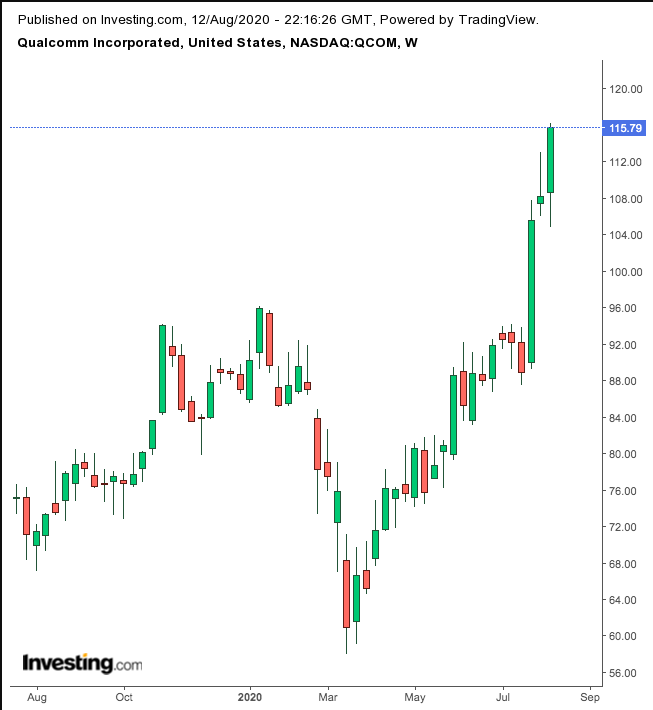Investing in chip stocks has been a profitable move during the current global downturn. Semiconductor companies saw demand for their products surge, boosted by the gaming industry and cloud-computing as more companies transitioned to having their employees work from home.
Nevertheless, many chipmakers are still facing an uncertain environment as US-China tensions escalate and the demand spike triggered by the sudden work-from-home trend likely subsides as the economy reopens and workers return to their corporate offices.
Most analysts expect the semiconductor business to improve in 2020, when the sector is anticipated to get a significant boost from the expansion of cloud infrastructure spending.
However, there are two chip stocks—Qualcomm (NASDAQ:QCOM) and NVIDIA (NASDAQ:NVDA)—that are in a different league. Each has balance sheet strength, robust cash flow and diverse product categories, which are all expected to remain strong in the current environment. Here's our view on which stock is a better buy in the current environment.
NVIDIA: Gaming and Data-Center Strength
A strong and impressive rally in NVIDIA shares during the current global health crisis clearly separates this chip stock from the crowd. NVIDIA's shares surged more than 90% this year, hugely outperforming the Philadelphia Semiconductor Index, which is up about 20% since the start of 2020.

While the chipmaker is unlikely to escape some demand slowdown from cyclical industries, like autos, analysts are focusing on the company’s supplies to gaming and data-center clients.
NVIDIA, based in Santa Clara, Calif., is the biggest maker of graphics chips used in personal computer gaming. Over the past few years, the chipmaker has successfully adapted its technology for the Artificial Intelligence market, creating a new multi-billion-dollar business.
According to Chief Executive Officer Jensen Huang, the use of such computing is spreading, making growth less reliant on the spending plans of a handful of companies.
The majority of the company’s sales still comes from PC gaming, where NVIDIA’s graphics chips create the most realistic experiences. Top-of-the-line GeForce parts cost more than many consumers spend on a whole PC.
After the stock's powerful rise this year, NVIDIA is now one of the most richly valued chip stocks with a price-to-earnings ratio of 83.59, fetching more than twice the semiconductor group’s average multiple of 38.53. That makes the stock susceptible to correction on any negative surprise, especially when the economic and geopolitical environment remains fragile.
Qualcomm Emerges Unscathed from Legal Battles
Unlike NVIDIA, Qualcomm is emerging from a tumultuous five-year period that included a high-stake anti-trust battle with the US government, an activist shareholder advocating for the company to split up, a $117-billion hostile takeover attempt and the scars of increasing US-China trade tensions.
But the good news for investors is that the worst is over and the future looks quite promising for Qualcomm, which produces chips that connect mobile phones and other devices to wireless networks.

The chipmaker won a major victory Tuesday in a federal appeals court, which ruled that a judge was wrong to side with the Federal Trade Commission in 2019 in finding that Qualcomm had violated anti-trust laws.
The appeals court also vacated an order that the company redo licensing accords with smartphone-makers like Apple (NASDAQ:AAPL) and Samsung Electronics (OTC:SSNLF). Such licenses generated $4.6 billion in revenue for Qualcomm last year.
The company, based in San Diego, is also getting a major boost from the ongoing shift to 5G.
“We are anticipating the next inflection point in our 5G ramp to start in (the September quarter), with strong year-over-year growth in revenue and earnings per share, leaving us well positioned for continued growth in fiscal year 2021,” CEO Steve Mollenkopf told analysts on an earnings call.
Canaccord Genuity’s Michael Walkley is now predicting a 47% upside potential for Qualcomm after taking his stock price forecast from $115 to $137 on July 30. Qualcomm stock has gained about 30% this year, closing at $115.79 on Wednesday.
“With smartphone volumes starting to recover and expected to improve in the second half of this year, Qualcomm is well-positioned to benefit from the long-term 5G investment cycle and anticipate recovering earnings in F2021,” Walkley said.
Bottom Line
Both NVIDIA and Qualcomm have compelling appeal for investors looking to benefit from a revival in chip demand. That said, Qualcomm seems to have more upside potential as the smartphone chip giant enjoys a period of relative calm and benefits from the rising appetite for new 5G handsets.
